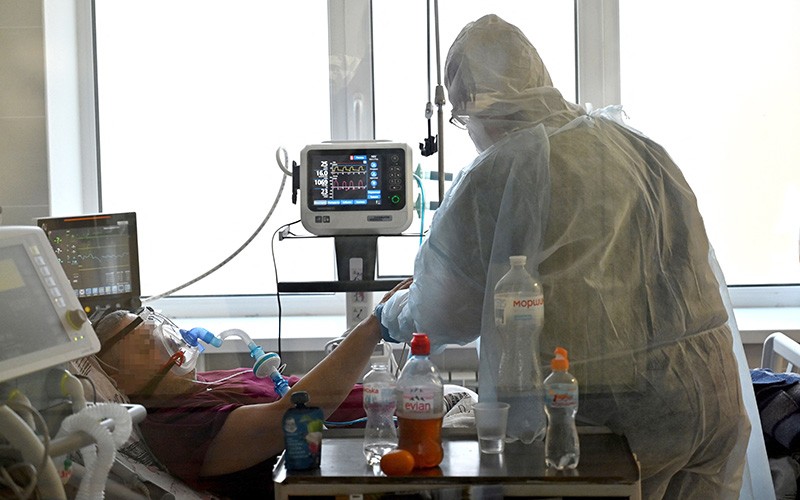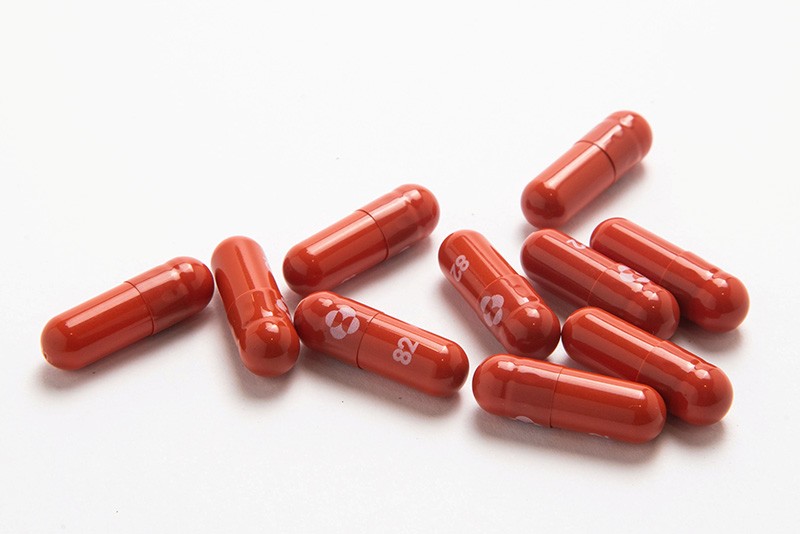’Tis the season of the antiviral. In just over a month, two antiviral drugs — both capable of being taken as a pill — have been found to cut COVID-19 hospitalizations and deaths in clinical trials of people treated soon after their initial infection.
On 4 November, the United Kingdom became the first country to approve molnupiravir, which was developed by Merck, based in Kenilworth, New Jersey, and Ridgeback Biotherapeutics in Miami, Florida. The approval came just over a month after the companies announced that the antiviral drug, which will be branded Lagevrio, halved the risk of hospitalization in people with mild or moderate forms of COVID-19. A day after the UK approval, Pfizer, based in New York City, announced that its antiviral drug Paxlovid cut hospitalizations by 89%.
If the results hold up in the real world, the medicines could be game-changers for the pandemic. Previous antiviral options against COVID-19 were expensive and had to be administered in a hospital. The new drugs are small molecules and can be taken at home. “They would be relatively cheap to manufacture,” says Charles Gore, executive director of the Medicines Patent Pool, a United Nations-backed organization based in Geneva, Switzerland, that works to increase access to medicines. “For large parts of the world that have not got good vaccine coverage, this is really a godsend.”
But little is known about how well the drugs will work, and how easily they could be used in the places that need them most. Nature looks at five key factors that could determine how the new COVID-19 antivirals shape the course of the pandemic.
How effective are the new antivirals?
Judging from the press releases, both drugs can slash hospitalizations — and potentially also deaths — from COVID-19 when they are given soon after infection takes hold. But until full reports of the clinical trials are released, some crucial details are missing.
Researchers will be looking at the ages and ethnicities of those who were enrolled in the trials, and at any other health conditions that they had, says John Mellors, an infectious-disease specialist at the University of Pittsburgh Medical Center in Pennsylvania.
Because antiviral drugs often need to be given early in the course of an infection for them to work effectively, Mellors will also be looking for more detail about when the drugs were given in the trials, and at how those timings correlated with efficacy. That information will provide a sense of when the window of opportunity for treatment closes. Neither trial had enough participants to enable firm conclusions to be drawn about the drugs’ ability to prevent deaths, but no deaths occurred in their treatment arms.
Researchers are also keen for any clue — including from further clinical trials — as to whether the drugs affect transmission of the coronavirus, or prevent illness in people who have been exposed to it.
If they do, the combination of vaccines and antiviral drugs could become a powerful tool in controlling outbreaks, says Jerome Kim, director general of the International Vaccine Institute in Seoul. For example, if a worrying coronavirus variant emerges in a specific region, those who are most likely to be affected could be given an antiviral drug to supplement immunity from vaccines. This could clamp down on the virus and prevent its spread. “It opens up some new possibilities for the way we think about control,” Kim says. “This would have a really dramatic impact.”
Are the treatments safe?
Both Pfizer and Merck have reported that their antivirals were well tolerated by study participants, and that potential side effects were minor. But both drugs have features that could limit who would be able to take them.
Molnupiravir acts by introducing mutations into the viral genome during viral replication. A metabolite of the drug is picked up by a viral enzyme called RNA-dependent RNA polymerase and incorporated into the viral genome, eventually causing so many errors that the virus can no longer survive.
Human cells have a DNA, rather than an RNA, genome, . But some laboratory studies have suggested that molnupiravir could cause mutations in human DNA as well1.
A full course of treatment with molnupiravir is only five days long. But regulators might be cautious, particularly when it comes to treating pregnant people, says Kim. “There’s probably going to be warnings around the use of this antiviral because of the potential risk,” he says.
Paxlovid acts by inhibiting an enzyme that’s needed to process some viral proteins into their final, functional form. But the drug is a combination of an antiviral and another drug called ritonavir, which helps to prevent enzymes in the liver from breaking down the antiviral before it has a chance to disable the coronavirus. Ritonavir, a component of some HIV treatment cocktails, can affect how some other medications are metabolized by the body. A wide range of drugs should not be given with it, including some that are commonly used to treat heart conditions, suppress the immune system and reduce pain.
This means that many people might not be able to tolerate the combination of Paxlovid and ritonavir. But Mellors notes that this antiviral drug regimen also lasts only a few days, and physicians might find ways to work around some drug–drug interactions. “There’s going to be a learning curve as to when it can be used, and when it can’t,” he says.
Will the drugs work against variants of concern?
In theory, the drugs should be effective against known coronavirus variants, including the highly transmissible Delta variant. These variants are primarily characterized by mutations in the viral spike protein and other regions that are targeted by the immune system — and by vaccines.
The targets of molnupiravir and Paxlovid are different, but researchers will still need to show that the drugs work against variants, says Mellors. Merck has done laboratory studies indicating that molnupiravir is effective against Delta and other variants — including the Beta variant, which was first identified in South Africa.
Another concern is that the way in which molnupiravir generates mutationsin the coronavirus genome could lead to the emergence of a new variant of concern. Although this is theoretically possible, Mellor thinks it’s unlikely. Laboratory studies have shown that molnupiravir generates a bevy of mutations in each viral genome, and the more mutations that the genome accumulates, the greater the likelihood that one of them will weaken the virus. “The chance that multiple mutations will enhance the virus is low,” Mellors says.
Could the coronavirus become resistant to antivirals?
Drug resistance is a familiar problem and is the reason that some viral infections, such as HIV and hepatitis C, are treated using combinations of antivirals. “The bottom line is that we’re going to need combination therapies,” says Katherine Seley-Radtke, a chemist who is developing antiviral drugs at the University of Maryland, Baltimore County.
So far, molnupiravir and Paxlovid have been tested only as single therapies. A 5 November analysis by the science information and analytics firm Airfinity in London found only 16 combination trials of COVID therapies that aim to enrol more than 100 participants. None involved molnupiravir or Paxlovid; most tested combinations with the malaria drug hydroxychloroquine, a drug that has repeatedly failed when tested as a single agent in rigorous clinical trials against COVID-19.
It will be important to look at people who don’t respond to molnupiravir or Paxlovid, to find out whether viral resistance is a factor, says Douglas Richman, an infectious-disease specialist at the University of California in San Diego. Researchers should also closely monitor people who receive the drugs and have weakened immune systems. Because infections might last longer in these people, there could be more opportunity for resistance to emerge, says Richman.
Who will be able to access the new drugs?
Merck has signed an agreement with the Medicines Patent Pool to provide the intellectual-property licences needed to produce molnupiravir in low- and middle-income countries. Several generic-medicines companies have already started to manufacture the drug.
Gore says that the patent pool is in discussions with Pfizer. Both companies have committed to tier pricing to allow lower- and middle-income countries to pay less for the drugs than wealthier countries.
But intellectual property is not the only barrier to access. Another concern is testing: administering the antivirals early in the course of an infection means that countries will need an ample supply of COVID-19 tests. “There’s a huge gap in testing in some countries,” says Kim. “We don’t want someone to be prescribing this if someone has COVID-like symptoms, but it turns out to be the flu, not COVID-19.”
Meanwhile, wealthy countries are already placing large orders for the drugs, raising concerns that their stockpiles will soak up supplies and limit access in other parts of the world. The situation is all too familiar, says John Amuasi, leader of the Global Health and Infectious Diseases Research Group at the Kumasi Centre for Collaborative Research in Tropical Medicine in Ghana. “Look at what’s happened with the vaccines.”
"still" - Google News
November 11, 2021 at 12:53AM
https://ift.tt/3H9UJQf
COVID antiviral pills: what scientists still want to know - Nature.com
"still" - Google News
https://ift.tt/35pEmfO
https://ift.tt/2YsogAP
Bagikan Berita Ini




















0 Response to "COVID antiviral pills: what scientists still want to know - Nature.com"
Post a Comment